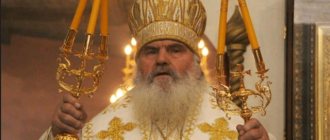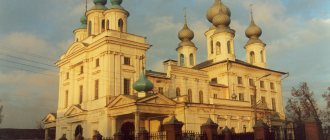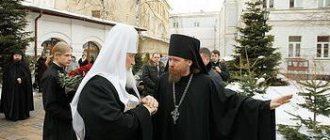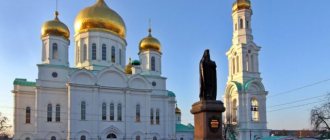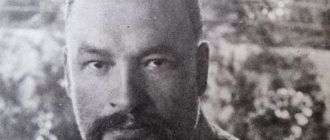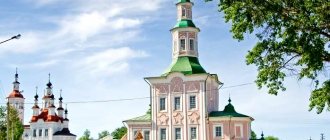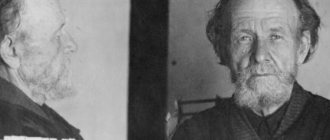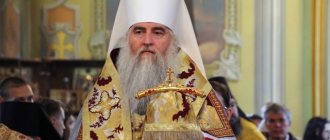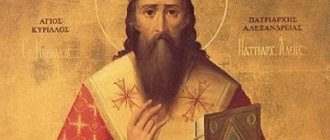Bishop Evgeniy of Bronnitsky became the new Bishop of Yekaterinburg and Verkhoturye, head of the Yekaterinburg Metropolis. Former Metropolitan of Yekaterinburg and Verkhoturye Kirill was appointed head of the Tatarstan Metropolis. This decision was made last Tuesday during a remote meeting of the Holy Synod of the Russian Orthodox Church.
The unexpected change of the head of the Yekaterinburg Metropolitanate has become one of the most discussed news. Metropolitan Kirill headed the Yekaterinburg Metropolis for more than nine years. Now he will take the place of the head of the Tatarstan Metropolis, the previous head of which, Metropolitan Feofan ( Ashurkov ), died at the age of 74 on November 20, 2020.
“The Kazan See, one of the most important in the Russian Church, was widowed, so an experienced and competent person was urgently needed there, and we have few rulers of this level in our country,” says the historian and publicist, candidate of historical sciences, deputy chairman of the Society for the Development of Russian Historical Sciences education “Double-Headed Eagle”, Lieutenant General of the Foreign Intelligence Service of the Russian Federation (retired) Leonid Reshetnikov . – Kazan is a very difficult place. There are slightly more Muslims there than Orthodox Christians, and this territory attracts the attention of our foreign ill-wishers who want to upset the religious peace that has been established there. And the ruler will have to face this new front. A novice bishop cannot be sent to Kazan - this is a place for a confident and strong one who can conduct competent politics and at the same time enter into dialogue with people. And Metropolitan Kirill, whom I have known for a long time, possesses all these qualities. This appointment is a real next step forward in his ministry. In Kazan it will be more difficult for him than in Yekaterinburg, but this must be considered as a responsible order of the patriarch.
Dossier "OG"
A metropolitanate is an episcopal see that has several bishoprics under its jurisdiction.
In modern Russia, metropolises were created in 2011 as part of the reform of the diocesan structure of the Russian Orthodox Church, which was launched by Patriarch Kirill .
The Ekaterinburg diocese, whose borders coincided with the borders of the Sverdlovsk region, was divided into three: Ekaterinburg, Kamensk and Nizhny Tagil. All together they formed the Yekaterinburg Metropolis.
Currently it consists of 5 dioceses:
- Ekaterinburg
- Alapaevskaya
- Kamenskaya
- Nizhny Tagil
- Serovskaya
The first Metropolitan of Yekaterinburg was Kirill (in the world - Mikhail Nakonechny ). At the same time, he was the head of the Yekaterinburg diocese.
Kirill headed the diocese for 9 years and 4 months. Only three bishops held this post more than him:
Kliment (Prestyuk) – 13 and 10 months (1966-1980),
Tobia (Ostroumov) – 12 years and 3 months (1944-1957),
Vikenty (Morar) – 12 years (1999-2011).
Young Kirill receives an education and takes monastic vows
The future metropolitan was born into a working-class family in a town with the poetic name of Verkhnechusovskie Gorodki. This happened on May 15, 1961. The parents gave the boy the name Mikhail, which he changed after being tonsured.
From early childhood he showed an interest in learning, and in his youth he began to ask questions that he found answers to in faith. In 1980, on October 25, Mikhail Nakonechny completed his secondary education and in the same year took monastic vows at the hands of Ahrimandrite Alexy, who served in the city of Vladimir in the Assumption Cathedral.
The young man was given a new church name, Kirill, in honor of Kirill Belozersky.
Literally the next day, the young monk Kirill was ordained to the rank of hieromonk. The ceremony was performed by Archbishop Serapion of Vladimir and Suzdal. This person will eventually play an important role in the fate of Nakonechny more than once. From that moment on, he began to serve in the Holy Assumption Cathedral, which was located in the city of Vladimir.
Metropolitan's legacy
The Yekaterinburg diocese is upset by Bishop Kirill’s move, but at the same time they understand that he is probably more needed now in the Tatarstan Metropolis. Kirill did a lot for the Sverdlovsk region.
First of all, he contributed to the revival and construction of new temples and churches. More than a dozen of them have appeared in our region over the past almost ten years: the Great Chrysostom Church in Yekaterinburg, the Alexander Nevsky Cathedral of the Novo-Tikhvin Convent, the Church of the Port Arthur Icon of the Mother of God, the Temple of the Holy Righteous Fathers Joachim and Anna in Verkhnyaya Pyshma, the Annunciation Church in the Academic district of Yekaterinburg and others. Today in the Yekaterinburg diocese there are about 90 churches in the process of construction and restoration.
The great achievement of the Bishop was the restoration of the Assumption Cathedral in the Verkh-Isetsky district of Yekaterinburg. During the Soviet years, a bakery was located on the territory of this architectural monument. For a long time the temple was abandoned. Renovation work in the cathedral has not yet been completed, but this has not prevented clergy from holding constant services there since 2013. The cathedral will apparently be consecrated by the new head of the Yekaterinburg Metropolis.
Metropolitan Kirill carried out extensive missionary and spiritual-educational work in the region and in the Ekaterinburg diocese entrusted to him. Many bright projects are dedicated to restoring the historical memory of society, preserving the memory of the new martyrs and confessors of the Russian Church, the Holy Royal Family and the Alapaevsk martyrs. By the way, the Royal Days, held annually in Yekaterinburg at the beginning of July, also began to attract a huge number of pilgrims only in recent years.
Over the past almost ten years, theological education in the Middle Urals has also undergone enormous development: the Yekaterinburg Theological Seminary was ranked in the TOP-7 theological schools in Russia, the Missionary Institute was opened, and the Department of Theology appeared at the Ural State Mining University.
Under Metropolitan Kirill, a spiritual and educational center of the Yekaterinburg diocese and a cultural and educational center were opened, where various significant cultural events take place. The Middle Urals have become a region for the revival of the traditions of choral singing - children's song creativity is developed here - the bishop's children's chapel "Oktoich" continues to delight with success, and "adult" choirs - the men's choir of the diocesan clergy, the choir of the missionary institute "Gorlitsa", the bishop's choir of the Holy Trinity Cathedral , parish choirs.
The Ekaterinburg diocese began to carry out a lot of work in the field of youth policy: youth associations are developing both sports and patriotic in orientation, for example, the Brotherhood of Orthodox Pathfinders and the “Russian Silomer” project, and creative ones, such as the “Imperial Ball” for the best graduates of secondary schools in the region, the intellectual game “ Know the truth”, numerous Christmas and Easter projects.
Social service has also been taken to a new level: for several years now, the Orthodox Charity Service has been operating in the Sverdlovsk region, which provides more than 20 areas of assistance to those in need. And, of course, the memory of the patroness of the Ural capital, St. Catherine, is being returned to the people of the Urals. Today, large-scale educational activities are being carried out in the educational and cultural space about the role of this saint in the life of Yekaterinburg; as a result of a city public survey, the construction site of a temple in her honor has been determined, and work is underway on the project of the main Orthodox cathedral of the region.
BIOGRAPHY PAGES
Bishop Evgeniy of Bronnitsky, His Grace of Yekaterinburg and Verkhoturye, head of the Yekaterinburg Metropolis, vicar of His Holiness the Patriarch of Moscow and All Rus' (in the world - Alexey Kulberg), was born in the Moscow region in 1972.
- In 1995 he graduated from the Moscow Aviation Institute, from 1990 to 2004 he worked at the Central Research Radio Engineering Institute named after. Berg in Moscow.
- In 1995 he entered the Orthodox St. Tikhon's Theological Institute, and in 2004 he was ordained a deacon.
- From 2004 to 2012 - rector of the Church of the Nativity of the Virgin Mary in the village of Velikoye, Yaroslavl region.
- In 2012, he joined the clergy of the Ekaterinburg diocese and became (until 2014) rector of the Greater Chrysostom Church in Yekaterinburg.
- In 2014, he defended his diploma at the Yekaterinburg Theological Seminary and became rector of the Ascension Bishop's Compound.
- In March 2015, he was appointed first assistant to the ruling bishop of the Yekaterinburg diocese.
- In July 2016, he was tonsured a monk, elevated to the rank of archimandrite, and became a bishop.
- Since 2018, he has headed the Nizhny Tagil and Nevyansk diocese after graduating from the All-Church graduate and doctoral studies at the Russian Christian Humanitarian Academy of St. Petersburg.
- Since March 11, 2022 - Deputy Chairman of the Synodal Department of Religious Education and Catechesis.
- On August 25, 2022, the Holy Synod appointed vicar of the Patriarch of Moscow and All Rus' with the title “Bronnitsky”, abbot of the Moscow Donskoy Stavropegial Monastery in Moscow and chairman of the Synodal Department of Religious Education and Catechesis.
Cyril becomes Serapion's secretary and follows him to different dioceses
Six months later, on May 6, 1981, the same Serapion awarded Kirill the rank of hieromonk. After which he went to serve in the clergy of the Alexander Holy Trinity Cathedral. In June 1982, Kirill was transferred to serve as rector of the St. Nixon Church in the city of Kirzhach. He also serves as dean in the churches of the Kirzhach region. In this city the priest stayed for a relatively long period of two years.
Metropolitan Serapion had a significant influence on the career of Kirill, who worked as his secretary for a long time
In March 1984, Kirill was transferred back to Vladimir. Here he is appointed abbot of the Holy Assumption Cathedral. In addition, he assumes the duties of secretary of Vladimir and Suzdal.
Later, the duties of the pious of all churches in the Vladimir region were added. A month later, he was elevated to the rank of archimandrite by Archbishop Serapion, who apparently took the career of young Kirill into his own hands.
Until a certain point, Nakonechny did not have a specialized spiritual education. However, he sought to correct this shortcoming and studied theology remotely, in absentia. His education ended in 1986, when Kirill became a graduate of the Moscow Theological Seminary.
In June 1987, Bishop Serapion was appointed metropolitan of the Moldavian diocese. Following him, Kirill goes to the MSSR. Here he is appointed rector of the Theodoro-Tironovsky Cathedral in the capital of the republic, the city of Chisinau.
At the same time, he continues to work as Serapion’s secretary. In addition, the responsibilities of a dean again fell on his shoulders. Only this time in the Chisinau region.
Deanery is when several churches are subordinate to one person.
A similar situation repeated itself again two years later. Metropolitan Serapion was again transferred to another place of service. This time to the Tula and Belyov Metropolis. Kirill continues to serve as the Metropolitan's secretary. The status of dean of churches continues to haunt the archimandrite. Only now the temples of Tula and its environs were under his care.
In 1995, Kirill was relieved of his position as secretary of the Metropolitan of Tula and Belevsky and his duties as dean. Instead, he becomes abbot of the St. Nicholas Church in Tula.
"Spiritual Descendant"
“Bishop Evgeniy of Bronnitsky, vicar of His Holiness the Patriarch of Moscow and All Rus', will be the head of the Ekaterinburg and Verkhoturye Metropolitanate, with his release from the post of vicar of the Don Stavropegic Monastery of Moscow and with his retention of the post of chairman of the Synodal Department of Religious Education and Catechesis,” – written in journal No. 93 following the meeting of the Holy Synod on December 8, 2022.
For the Middle Urals, this is, one might say, a great success: Bishop Eugene is a direct “spiritual descendant” of Metropolitan Kirill. He arrived in Yekaterinburg following Metropolitan Kirill from Yaroslavl in 2012, and the last eight years of his life were closely connected with our region. By the way, media representatives especially value him: he always readily responded to requests for comments on various, even uncomfortable topics.
– Vladyka Evgeniy is a pupil of the Metropolitan Bishop. He was his right hand for a long time, he knows the Yekaterinburg Metropolis very well and all the nuances of its work,” the press service of the Yekaterinburg diocese told Oblgazeta. – A very harmonious appointment. This means that all the affairs and undertakings that Metropolitan Kirill left behind will be continued. Bishop Eugene should be elevated to the new rank in the near future, while he is still in Moscow.
Leonid Reshetnikov believes that Bishop Evgeniy is a confident and true believer, with whom the Yekaterinburg diocese will continue to develop. A similar opinion is shared by religious scholar, sectologist, Doctor of Historical Sciences, professor at Moscow Linguistic University Roman Silantiev . But he emphasizes that it will not be easy for the new metropolitan.
“The fact that Bishop Eugene, a close associate of Metropolitan Kirill, became the new metropolitan hints that the bishop’s policy suited the church,” says Roman Silantiev. – If, for example, Metropolitan Vincent were returned back, it would be a hint that the policy needs to be changed dramatically. And so the continuity will be preserved, the former and current metropolitans are like-minded, although, of course, Vladyka Eugene will do something of his own. This is important because it is necessary to solve the problem of the Sredneuralsky Monastery and the Cathedral of St. Catherine. The issue with Romanov will be resolved, but this sect and the scandal itself do not have the best effect on the prospects of the cathedral. It will not be possible to solve this quickly; many years will pass, so it will be difficult for Bishop Eugene.
A COMMENT
Pyotr MULTATULI, Candidate of Historical Sciences, Associate Professor of the Department of History and Historical Archives of the Moscow State Institute of Culture:
- The new metropolitan of the Ekaterinburg Metropolis will have a difficult time, since he will have to resolve two important issues: the construction of the Church of St. Catherine and the situation with the Sredneuralsky Monastery.
As for the construction of the temple, people need to shake themselves up and understand that this is important first of all for them. In my opinion, the spiritual situation has changed, and now the most important temple in Yekaterinburg is the Church on the Blood, but there must also be a temple for the spiritual patroness of the city. You need to start doing something when the people express their will, but, unfortunately, they remain on the sidelines.
The situation is the same with excommunicated Nikolai Romanov, former father Sergius. As long as some people go to this schismatic, this situation will be fueled, and it will be difficult for any metropolitan to resolve this issue. People who go there do not understand that by doing so they are further weakening the Russian Church and violating its holy canons.
I know Vladyka Evgeniy well - he is a very wise shepherd. He is a deeply religious man who knows how to talk to people, and I hope that with his holy prayers the situation will improve. And, of course, with the prayers of Metropolitan Kirill, who will not forget his people even in Kazan.
Parishioner's opinion
Nadezhda MALTSEVA, parishioner and former employee of the Church of the Nativity of Christ in Uralmash:
“Metropolitan Kirill headed our diocese for almost ten years, and during this time the believers developed respect and love for him. Vladyka often traveled around the region, consecrated new churches, and took care of monasteries. He paid special attention to the monasteries in Verkhoturye, Alapaevsk and Ganina Yama - every year they became more and more beautiful and famous outside our country. Under him, Orthodox life in Yekaterinburg began to flourish: Patriarch Kirill . It’s sad that Bishop Kirill is leaving for Kazan. The only good news is that Bishop Evgeniy will return to Yekaterinburg. I had the opportunity to meet him when he was the Bishop of Nizhny Tagil. He is a wonderful person - wise, courteous, open. And most importantly, he lived in our region for eight years and he does not need to delve into the church affairs of the metropolis.
